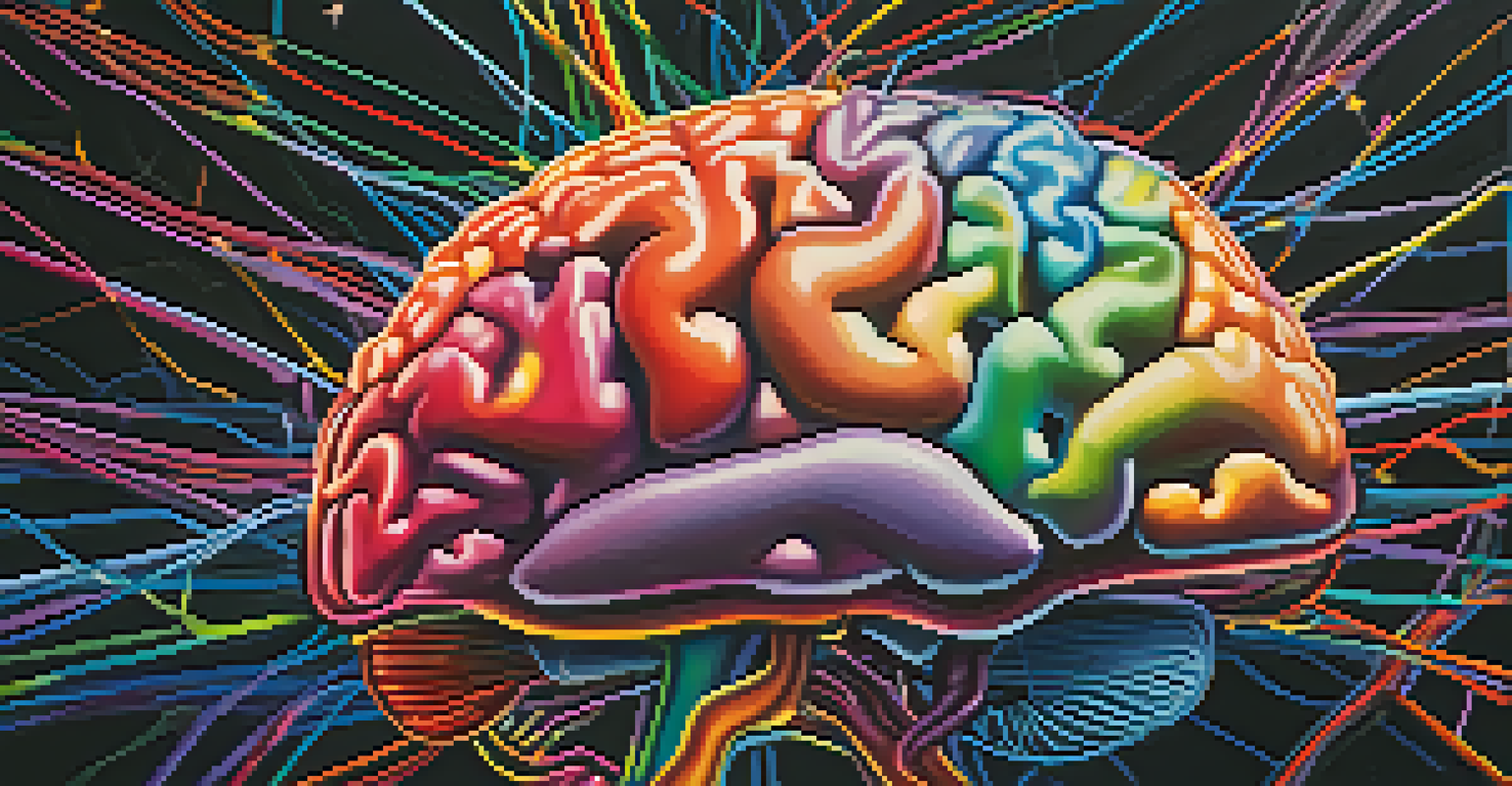Exploring Psychedelics: A Gateway to Greater Empathy

The Rising Interest in Psychedelics and Empathy
Lately, we’ve seen a resurgence in the interest surrounding psychedelics, particularly in how they relate to enhancing empathy. More people are turning to substances like psilocybin and MDMA, not just for recreational use, but as tools for personal growth and emotional connection. This shift in perspective can be attributed to a growing body of research that highlights the potential therapeutic benefits of these substances.
Psychedelics can help us reach deep into ourselves and connect with others in ways we never thought possible.
For instance, studies have shown that psychedelics can help individuals confront and process deep-seated emotions, which often leads to greater understanding of oneself and others. Imagine being able to step into someone else’s shoes, truly feeling their experiences and emotions. This is the essence of empathy, and psychedelics might just be the key to unlocking it.
As we delve deeper into this topic, it becomes clear that the relationship between psychedelics and empathy is not just a fleeting trend but a profound exploration of human connection. The more we understand this connection, the more we can harness it for positive change in our lives and communities.
How Psychedelics Affect the Brain’s Empathy Centers
Psychedelics are known to alter brain chemistry, particularly in areas responsible for empathy and emotional processing. When individuals consume these substances, they may experience increased connectivity between brain regions, allowing for more profound emotional experiences. This heightened state of awareness can lead to a greater understanding of others' feelings and perspectives.

To illustrate, consider a person who has always struggled to connect with their emotions. After a guided psychedelic experience, they might find themselves more attuned to their own feelings, which in turn allows them to empathize better with those around them. This interplay between self-awareness and empathy is crucial for building deeper relationships.
Psychedelics Enhance Empathy
Research indicates that psychedelics can promote emotional connections, allowing individuals to better understand themselves and others.
Research has suggested that psychedelics can promote neuroplasticity—the brain's ability to reorganize itself by forming new neural connections. This means that the empathy gained from these experiences could have lasting effects, helping individuals develop more compassionate and understanding behaviors over time.
Personal Stories: Transformative Experiences with Psychedelics
Many individuals have shared personal stories of transformation after using psychedelics. For example, one person recounted how a guided session with psilocybin helped them confront their past traumas, leading to a newfound compassion for themselves and others. These narratives often highlight the cathartic release that can occur during psychedelic experiences, enabling deeper emotional connections.
When we heal ourselves, we heal the world around us.
Anecdotes like these serve as powerful reminders of the potential these substances hold. They illustrate how breaking down emotional barriers can pave the way for empathy and understanding. As more people share their journeys, it becomes clear that psychedelics can act as catalysts for profound emotional growth.
While these personal stories are compelling, they also underscore the importance of responsible use and proper guidance. When approached correctly, psychedelics can be a powerful means of fostering empathy and connection—not just for oneself, but for the greater community.
The Role of Set and Setting in Psychedelic Experiences
One of the key factors in the effectiveness of psychedelics is the concept of 'set and setting.' Set refers to the mindset of the individual, while setting pertains to the environment in which the experience occurs. Together, these elements can significantly influence the outcomes of a psychedelic journey, particularly regarding empathy.
For instance, a comfortable, safe environment can enhance feelings of trust and openness, which are essential for exploring emotions deeply. Imagine attending a gathering where everyone is supportive and encouraging—this kind of setting can amplify the positive effects of psychedelics, making it easier to connect with others on an emotional level.
Set and Setting Matter
The effectiveness of psychedelics in fostering empathy is heavily influenced by the individual's mindset and the environment during the experience.
Conversely, a chaotic or uncomfortable setting can lead to anxiety and fear, hindering the potential for empathetic experiences. Understanding the importance of set and setting can empower individuals to create conditions that foster emotional connections and personal insight during their psychedelic journeys.
Therapeutic Applications: Empathy in Clinical Settings
The therapeutic applications of psychedelics are gaining traction, particularly in clinical settings where empathy plays a crucial role. Therapists are increasingly using substances like MDMA in controlled environments to help patients process trauma and improve their emotional connections. This approach has shown promising results, particularly for individuals with PTSD.
In these therapeutic settings, the empathetic bond between therapist and patient is paramount. Psychedelics can enhance this bond, making patients feel heard and understood in ways they might not have experienced before. The result? Patients often report feeling more connected to their emotions and, as a result, more capable of empathizing with others.
As research continues to unfold, the potential for psychedelics to revolutionize mental health treatment becomes clearer. The integration of empathy into healing processes can lead to more effective therapies, ultimately benefiting individuals and society as a whole.
Cultural Perspectives on Psychedelics and Empathy
Cultural attitudes toward psychedelics vary widely, influencing how empathy is perceived and cultivated within different societies. In some indigenous cultures, psychedelics have long been used in spiritual ceremonies to foster community connection and empathy. These practices often emphasize the importance of understanding and compassion for one another, which is critical for cohesive living.
In contrast, modern Western perspectives have often stigmatized psychedelics, viewing them primarily as recreational substances. However, as more research emerges showcasing their potential for fostering empathy, this perspective is beginning to shift. A growing recognition of the historical and cultural significance of psychedelics could pave the way for broader acceptance and understanding.
Therapeutic Use in Mental Health
Psychedelics are increasingly being used in clinical settings to enhance empathy between therapists and patients, aiding in trauma processing.
By learning from diverse cultural practices, we can expand our understanding of how psychedelics can foster empathy and connection. This integration of traditional wisdom with modern science has the potential to reshape our approach to emotional health and interpersonal relationships.
Future Directions: Research and Societal Impact
As the field of psychedelic research continues to grow, so does the potential for societal impact. Ongoing studies are exploring how these substances can enhance empathy not only in therapy but also in broader social contexts. The implications of this research could lead to new approaches in education, conflict resolution, and community building.
For example, imagine a world where empathy-enhancing psychedelics are integrated into educational programs, helping students understand diverse perspectives from a young age. This could foster a generation more attuned to emotional intelligence, leading to more compassionate societies. The possibilities are truly exciting.

However, it’s essential to approach this future with caution and responsibility. As we explore the benefits of psychedelics, we must also consider ethical implications, access, and integration into society. Balancing innovation with responsibility will be crucial in harnessing the power of psychedelics for collective empathy and understanding.